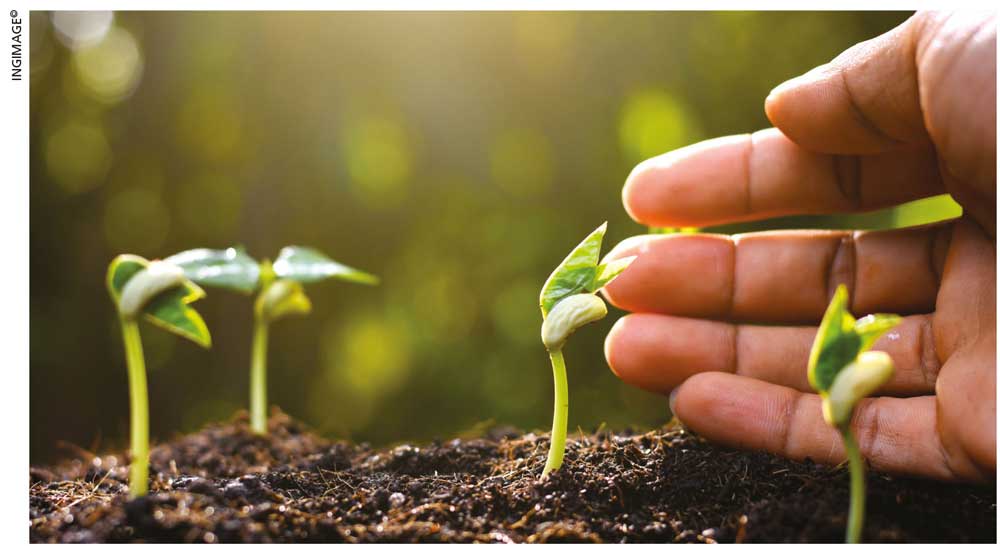AGRICULTURE SECTOR
GOING GREENTHE SMART WAY
Akila Wijerathna writes that yield must be increased in a sustainable manner

Today, farmers are expected to produce sufficient agricultural products at affordable prices to meet the demand created by a rising global population. They are also expected to achieve this under conditions of increasing production costs, scarce natural resources and rapid climate change.
Farmers who embrace sustainable agriculture try as much as possible to impact the environment and their surrounding ecosystems positively.
Sustainable agriculture aims to meet society’s food needs without compromising on the ability of future generations to meet their own requirements. It also contributes to a robust economy by turning farms into profitable ventures.
Therefore, the growing awareness of unintended impacts associated with some agricultural practices has led to heightened social expectations for improved standards in agriculture, the environment, the community, labour and animal welfare.
The green revolution made it possible for humanity to feed growing populations in past decades while negatively impacting the environment, and neglecting nutrition and overall wellbeing.
It follows that sustainable agriculture must now address the shortcomings of the green revolution and try to build on past successes.
Sustainable agricultural growth includes the efficient use of land, labour and other inputs, by means of technological progress, social innovation and new business models. Resource sufficiency concerns over the last century were overcome by the development and implementation of new agricultural technologies, rather than increased land areas devoted to farming.
For example, much of the rise in the productivity of maize can be attributed to higher yields for every unit of land due to improved breeding, fertiliser use, pest management and irrigation.
A key strategy for achieving long-term increases in production is through sustainable mechanisation, which can deliver multiple benefits including reduced labour for small-scale farmers, improved timeliness in farming operations and increased input efficiency.
In the longer term, mechanisation will support the sustainable intensification of production systems, and help build an agriculture sector that’s more resilient to extreme and unpredictable climatic events.
Recent work by the FAO and others has identified several good practices that can help the sustainable production of food, bio-based products and bioenergy including biofuels. These include agro-ecological zoning and complementing food production with bioenergy generation through sustainable agriculture intensification.
There is also potential for developing integrated food energy systems that optimise land use through mixed food and energy crop systems, and the increase of biomass for energy.
And there’s an urgent need for interdisciplinary and transdisciplinary research by biology, economics, engineering, chemistry and sociopolitical agencies, to produce sustainable agriculture and food systems.
A transformative approach to improving agricultural sustainability will dramatically increase integrative research by bringing together multiple disciplines simultaneously to address key issues beyond the agro-ecological dimension.
This will facilitate the development of production approaches that capitalise on synergies, efficiencies and resilient characteristics associated with complex ecosystems, and their links to socioeconomic and biophysical systems.
It will place the emphasis on integrating information on productivity and the environment, as well as the socioeconomic aspects of farming systems – to understand their interactions, and address resilience and vulnerability to changing climatic and economic conditions.
Moreover, integration will include expanded attention to the role and development of new markets, policies and approaches to R&D that are likely to sustain systems oriented agriculture.
Investments in research and development need to be stepped up by addressing climate change, conserving natural resources and facilitating the transition to sustainable agriculture.
This is required for the adoption of sustainable production systems and practices, including integrated crop/livestock and aquaculture/crop systems, conservation agriculture, agroforestry, nutrition sensitive agriculture, sustainable forest and fisheries management.
These and other forms of ‘climate smart agriculture’ will help farms, ecosystems and communities to adapt, mitigate and build resilience to climate change, as well as address country specific needs and gender related contexts.
Furthermore, agencies and charitable foundations that support R&D in sustainable agriculture should ensure that funded programmes emphasise a systems approach – one that reflects the need for adaptability of management strategies and technologies, to dynamic local socioeconomic and biophysical conditions, and supports efforts to increase market access.



